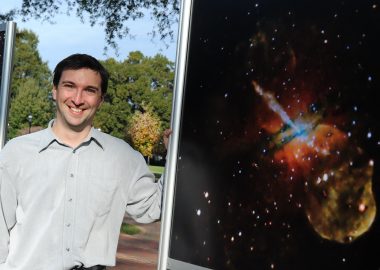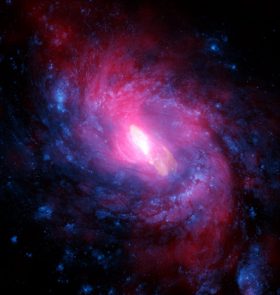In May, NASA will point its Chandra X-Ray Observatory toward a black hole 150 million light years from Earth to collect data for more than three straight days, the longest observation ever made on such a cosmic feature. Leading the team behind the deep space research will be Dan Evans, one of Elon University’s newest faculty members, and a rising star himself in the realm of astrophysics.

Evans joined the Elon faculty this fall and brings with him $250,000 of external grant funding for a series of research projects on which he is the principal investigator. He said the goal of his work is to test Einstein’s theory of relativity, the idea that the closer an object is pulled toward the center of a black hole, the slower time appears to pass.
And he’s conducting his research with help from undergraduate students at the university.
The Chandra X-Ray Observatory, a $3.5 billion satellite mission for NASA, can see into the universe and study black holes in ways that have never been done, Evans said. He’s spent the past decade researching black holes, considered crucial to the formation and behavior of galaxies, and Evans considers himself “very lucky” to have been given 85 hours of dedicated time with the satellite.
The assistant professor of physics will be doing two things: Measuring the spin of the black hole, and studying the winds and jets that come out of it, which can directly affect the formation of stars throughout the galaxy in which it is located. “I’m really committed to getting as many students involved with this as I can,” he said. “My end goal is to send them to their first professional astronomy conference in Madrid next summer.”
The two freshmen joining Evans – Matthew Barger and Todd Calnan – are already learning the computer programs needed to analyze data. Calnan, a physics major with an interest in cosmology, said he was excited at the prospect of working on the black hole research when the possibility first emerged in September.
That excitement has only grown as his work with Evans expands.
“He’s a really curious guy, and he expects you to have the same kind of passion,” Calnan said. “Dr. Evans has a focused energy. It’s very intense, and it‘s fun to watch. When he gets on something he likes, you can feel it, and it makes you want to do more.”
A colleague from Yale University made similar observations.
“He’s one of the most thorough people I’ve ever worked with,” said Kevin Schawinski, the Einstein Fellow at Yale who is working with Evans on the Chandra research. “Speaking for myself, it’s one of the coolest things to work on. As we learn more and more, we’re finding that black holes are a fundamental component of shaping our galaxies.”
Evans earned his master of science in physics from the University of Durham and his doctorate in astrophysics from the University of Bristol, both of which he attended in his home country of England. From 2005-2008, he served as a postdoctoral fellow at Harvard University before taking a position as the Chandra/HETGS Postdoctoral fellow at the Massachusetts Institute of Technology through last spring.

Evans wants to share his work – and his passion for space – with the public. A seasoned expert on television, he frequently appears on The History Channel’s “The Universe” program and has spoken with other regional and national media. He’s also directing the “From Earth to the Universe” exhibit that’s appearing this month at Elon. The display on the walkways around the Academic Village contains images of the cosmos captured by the Hubble, Chandra and Spitzer satellites.
“I want to place Elon firmly as a center in the country for engaging undergraduates in astrophysics research,” Evans said this fall from his office on the second floor of the McMichael Science Building. “These projects will give students an amazing opportunity to explore astronomy, physics, and the universe around them.”


